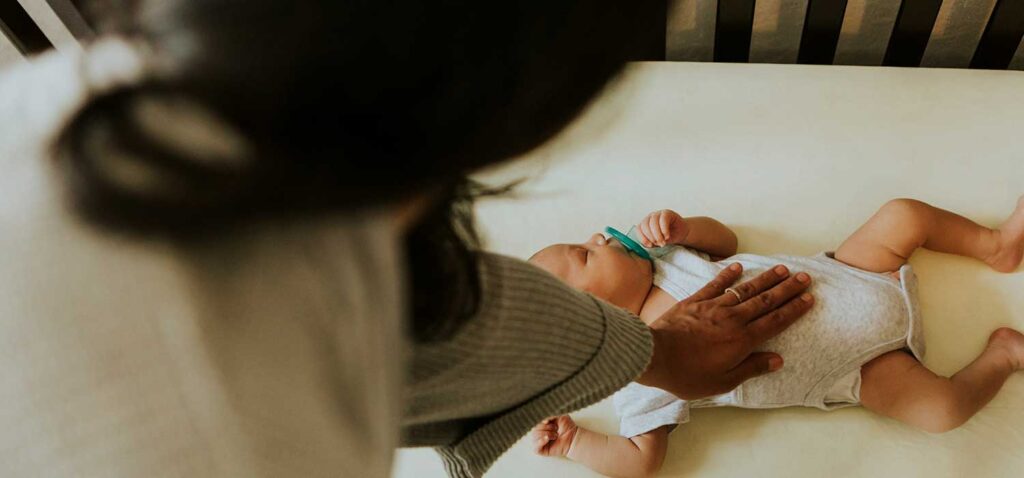
Help! My newborn refuses to sleep in their bassinet or crib.
The early newborn days are both blissful and exhausting. You’re getting to know your baby and they are getting to know you in the outside world. Sleep is one of the skills that isn’t established right away and this can catch many parents off guard. As a newborn sleep coach, most parents that I work with expect some degree of sleep loss in the newborn days; however, sleep deprivation can be absolutely crushing to parents as they also meet every other need of their new baby. This is in addition to jobs, other children, and household duties. I remember those days vividly with my first daughter and wonder how we survived.
As a Fort Collins, Colorado-based newborn sleep coach, one of the most common concerns expressed by newborn parents is that their new baby has an aversion to their bassinet or crib and either won’t sleep very long in their own sleeping space or downright refuses to sleep at all unless being held. Parents often wonder if their baby is afraid of their bassinet or crib or doesn’t like that brand or model.
Is there something wrong with the crib or bassinet? Why doesn’t my baby like their crib or bassinet?
Although it’s reasonable to expect your newborn to be adjusting to their new sleeping space, it’s important to not personalize your baby’s reaction and conclude that they do not like their bassinet or crib. Your baby is not having complex thoughts about their crib. The sleeping space itself likely has nothing to do with the aversion to sleep at all.
So, what is the issue? Why won’t your newborn sleep in the bassinet? Why won’t your baby sleep in the crib?
As a Fort Collins newborn sleep consultant my answer is simple; your baby is overtired. If I could make an estimate based on my experience as a newborn sleep coach, I would say 90% of infant sleep challenges are caused by a lack of sufficient sleep. The other 10% have feeding difficulties and often the inability to eat enough due to a structural issue with their mouth causing weakness and oral motor disfunction.
A newborn baby has a very low threshold for how long they can stay awake before quickly becoming overtired. From newborn to 6 weeks old, your baby can only stay awake a maximum of 45 minutes before they need to fall asleep again. In that 45-minute awake window, your baby needs to wake up, take a feed if it’s time, have a diaper change, and go back to sleep. Parents often worry that they rarely see their baby’s eyes open in the early days, however, that will change with time. Your newborn needs upwards of 18-20 hours of sleep per 24-hour time frame. Shocking right? Newborn naps can range from 30 minutes to 3 hours so keep your expectations low at this point. It’s not likely your baby will be sleeping 3 hours every single nap and often time newborns need to be woken up to meet feeding and caloric goals.
If you’re feeling overwhelmed by meeting your baby’s sleep needs, remember that there are no rules for newborn sleep except following all safe sleep recommendations. Newborn babies need a lot of help getting to sleep, staying to sleep, and soothing when upset. Hold your baby to sleep, rock them to sleep, use pacifiers, and expect them to sometimes fall asleep eating. I promise you will not ruin your baby’s future sleep by creating these habits in the early days. Once they reach 3-4 months old, you can start shaping their sleep to more of a long-term sustainability in terms of skills and soothing. Until then, snuggle that baby and enjoy them!

How does this relate to your baby not sleeping in their bassinet or crib?
As a Fort Collins newborn sleep consultant, my best advice for getting your baby to sleep in the bassinet or crib is to not allow them to get overtired. If you lay your baby down past the optimal awake window, a hormonal response has already taken place and the body is producing cortisol and adrenaline to stay awake. Imagine drinking an expresso while trying to sleep. If you miss their awake window, hold them to sleep or pop them in a stroller or car. Expect that they may cry more than normal and need a lot of help getting to sleep. Try to follow their awake windows more closely next time. Start slow and try 1-2 times a day to lay them down for a nap in their bassinet (more if tolerated well). Your baby will still need your help falling to sleep which may come in the form of holding until drowsy, rocking, or putting your hand on their chest. I also recommend swaddling your baby for sleep and making sure they have their tummy full before attempting to lay them down.
A sleep coach can help! Get in touch today to learn more about newborn sleep & help your baby to sleep in the bassinet or crib.
If you’re still struggling with your newborn’s sleep, reach out! As a Fort Collins newborn sleep coach, I have specialized training in newborn sleep and have worked with hundreds of parents just like you; downright exhausted. There is hope for you too!
